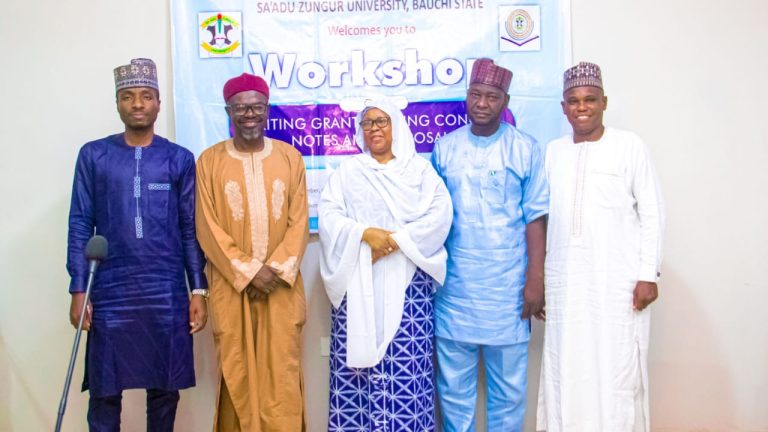From Paul Orude Bauchi
The Centre of Excellence for Research and Innovation (CERI) in collaboration with Sa’adu Zungur University has organized a workshop on Writing Grant-Winning Concept Notes and Proposals for academic staff of the university to enhance their research capacity.
In her opening remarks, at the two-day workshop held at the university’s Gadau main campus and Yuli Campus, the Vice Chancellor of Sa’adu Zungur University, Professor Fatimah Tahir emphasized the importance of the training.
Tahir, who disclosed that the writing grant-winning proposals was crucial for the university’s research growth and development, reiterate the need for the academic staff to understand the requirements for accessing grant, noting that each grant has its peculiarities, which the workshop seeks to acquaint them with the knowledge of.
“Each grants have their own requirements. If you don’t understand the requirements of any grant, you would not be able to access it,” she said.
She argued that nowadays universities are boasting of how many awards they are able to secure, which is also related to the good research work they have produced, hence urged that Sa’adu Zungur University should not be left behind.
“This workshop is very important. I implore you to please listen attentively, participate actively and let your contribution be recognized,” the VC said.
She also expressed gratitude to the Center of Excellence for Research and Innovation CERI for partnering with the university to organize such a workshop.
In his remark, the Director of CERI, Dr. Usman Adamu Garkuwa, said that the workshop was organized to address the need for researchers to access funding opportunities.
He said they recognized the challenges faced by academic staff in writing winning proposals and decided to bridge the gap with the workshop.
Garkuwa added that the society has a number of problems in which there are many aspects of human lives that are poorly researched in an attempt to find lasting solutions to these societal problems.
“If you go to the data base, you see that there are a lot of aspects of our living that is poorly researched and you will hardly find information about these things. Then we have a lot of challenges ranging from healthcare system, economic problems, security problems, out-of-school and what have you,” he said.
According to him, people in the academia have a great roles to play in helping to solve some of these societal problems, and therefore need to be trained on how to get funding for their research.
“We now see that why don’t we train ourselves on research and then how do we seek for funding, since we know this research is not possible without adequate funding from the National Research Funding and other funds that are out there waiting for teeming people from the academia to come and access,” he said.
Garkuwa added that benefit of this training is beneficial to not only the participants but olso the university in general as the institution will benefit from each grant received for a particular research purpose.
Facilitators at the workshop highlighted the importance of building a strong research team and leveraging collaboration to secure grants.
Participants on their part expressed their gratitude for the opportunity, saying that the workshop has equipped them with the skills to write a winning proposal. They said the interactive sessions and feedback from facilitators were particularly helpful.
The workshop demonstrated the university’s commitment to research excellence and capacity building. With the skills acquired, participants are expected to contribute to the university’s research growth and secure funding opportunities
